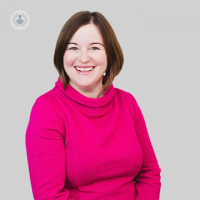How do I know if my child has a squint?
Autore:Squints are more common than you might think – they affect 3% of children in the UK. We interviewed leading consultant ophthalmologist Miss Stephanie West to find out how to spot the signs of a squint in your child, the difference between a squint and a lazy eye, and when to see a doctor if you’re concerned.

What is a squint? Is it the same thing as a lazy eye?
A squint (also known as strabismus) is where both eyes are not pointing in the same direction at the same time i.e. there is a misalignment.
For example, one eye could be turning in or out whilst the other eye is straight. This can happen all the time or only intermittently and can affect just one eye or both eyes.
A ‘lazy eye’ is different to a squint – the medical term for a ‘lazy eye’ is amblyopia. This is where there is reduced vision in an eye even though it is structurally normal. It is common to get amblyopia and a squint at the same time, but it is also possible to just have amblyopia on its own.
How common are they?
Squints are common, affecting 3% of children in the United Kingdom. Amblyopia has a similar occurrence, affecting 2% of children.
What signs / symptoms should I watch out for?
If your child is three months and older and you notice a misalignment of the eye – even if intermittently – then you should seek advice. Other signs and symptoms can include:
- your child using a specific head posture to look at things, for example, tilting their head to one side
- closing one eye to focus on things or in bright sunlight
- complaining of double vision
Why is it important to get a squint treated?
It is important to get a possible squint looked at as it may be a sign of amblyopia or affect your child’s visual development. Treatment may involve monitoring vision, glasses, wearing a patch over one eye, using eye drops to dilate a pupil, using Botulinum Toxin, or even surgery to help straighten the eye position.
Who should I go and see?
The ideal person to see is an ophthalmologist who specialises in eye conditions in children, particularly squints. Your visit should also include an eye movement assessment with an orthoptist. It is also sensible to have school-aged children regularly checked with a local optician.
If you are concerned about your child’s eyesight, click here to book a consultation with Miss West.


